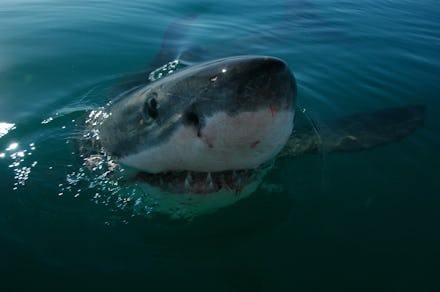This "Accidentally Caught" Great White Shark Just Died in a Japanese Aquarium

For great white sharks, the mantra "just keep swimming" is necessary for survival: If sharks ever stop moving, they die from lack of oxygen. The newest addition to Japan's Okinawa Churaumi Aquarium seemed to be doing fine, reported the Guardian, until he sunk to the bottom of the tank three days after he was unveiled to spectators.
The male 11.5-foot great white was captured "accidentally," says the Guardian, off Japan's southwest coast on Tuesday — though the circumstances of the capture were not immediately clear. When he was first delivered to the aquarium, the shark wouldn't eat, but swam with the other sharks before he suddenly stopped. Aquarium staff rushed to transfer the shark to another tank where they could give him oxygen, but it was to no avail.
While a definitive cause of death is under investigation, Vice President for PETA Asia Jason Baker opined, according to the Guardian. "The cause of death is clear: captivity. The shark never had to die like this."
Japan doesn't have a shining track record when it comes to treatment of marine life. Though the Japanese International Court of Justice ruled in 2014 that government-funded whaling was illegal, whalers are ignoring the decision. In December, the government approved a "scientific research" expedition whose mission is to kill 333 whales in the Antarctic Ocean.
As with whales, the Japanese also hunt dolphins for their meat. The 2009 documentaryThe Cove sought to raise awareness about the fishing practices in Taiji, Japan, and spur legal change. But just last month, EcoWatch reported up to 90 bottlenose dolphins were captured in the cove of the film's title, resulting in the deaths of 30 dolphins.
The Okinawa Churaumi Aquarium believed themselves to be the first to boast a great white shark. Said an aquarium researcher to the Associated Press, "Many visitors had asked us to exhibit the great white shark."